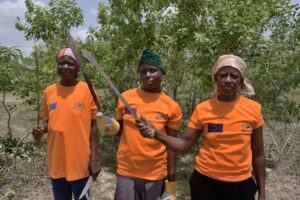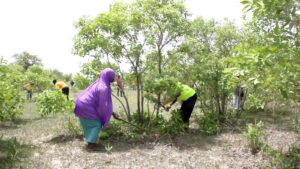… LEAN project offers blueprint for achieving the SDGs
By Samuel AKAPULE
As the global community pushes toward achieving the United Nations Sustainable Development Goals (SDGs), two of the most interlinked yet under-addressed challenges—poverty and environmental degradation—remain persistent.
In rural Ghana, particularly in districts such as Kassena-Nankana West in the Upper East Region, this relationship is both stark and urgent.
Here, families facing limited economic opportunities often turn to the environment for survival—felling trees for charcoal production and exhausting land through unsustainable agricultural practices.
Studies conducted by the Centre for Climate Change and Sustainability Studies at the University of Ghana, in partnership with the International Union for Conservation of Nature (IUCN), confirm that deforestation in northern Ghana is largely driven by economic necessity, creating a vicious cycle: poverty depletes the environment, and environmental decline worsens poverty.
A scalable solution: The LEAN project
The Landscapes and Environmental Agility across the Nation (LEAN) project, funded by the European Union and implemented by World Vision Ghana and partners—Rainforest Alliance, Tropenbos Ghana and EcoCare Ghana—provides a scalable and community-driven model that addresses both poverty and environmental decline in tandem.
At the heart of LEAN is the principle that land restoration is inseparable from livelihood restoration. The initiative tackles multiple SDGs, notably SDG 1 (No Poverty), SDG 13 (Climate Action) and SDG 15 (Life on Land), through a holistic approach to conservation and economic empowerment.
A recent field visit organised by World Vision Ghana for the media revealed remarkable results: 284 hectares of degraded land have been restored in the Kassena-Nankana West District alone—land voluntarily made available by local chiefs and communities.
Livelihoods rejuvenated, ecosystems revived
Beneficiaries such as Awumda Wachio attest to the profound impact the project has had. “Before the project, it was difficult to find medicinal herbs. But now, with the regrowth of once-extinct trees, traditional healers no longer have to travel long distances,” she said.
The project promotes Farmer Managed Natural Regeneration (FMNR), an indigenous tree management practice where farmers are trained to prune naturally regenerating trees and use organic mulch to restore soil fertility. Communities have also formed fire volunteer groups to protect young trees from bushfires.
Over 6,000 smallholder farmers across 25 communities have benefitted, resulting in reduced deforestation and improved livelihoods.
Greening the economy: Financial inclusion and income diversification
Beyond land restoration, LEAN incorporates a strong economic empowerment component. According to the Assemblyman of Navio-Samwo, Bismark Kwotuah Kukuladam, formerly barren landscapes are now rich in vegetation, offering both environmental and economic benefits.

Tree nurseries managed by trained community volunteers have raised over 100,000 seedlings—ranging from shea and mango to rosewood and baobab—supporting agroforestry and carbon reduction efforts.
Meanwhile, nearly 1,500 community members, mostly women, have formed Savings for Transformation (S4T) groups, gaining access to financial literacy, leadership training and entrepreneurship skills. These groups have generated over GH¢1million in savings, allowing members to launch small businesses and reduce reliance on unsustainable activities such as charcoal production.
Comfort Aniboyono, a beneficiary from Boania, highlighted that the intervention has led to improved household income, access to healthcare and food security—aligning with SDGs 1, 5, and 8.
Other interventions include the distribution of goats and sheep to 150 farmers, bee-keeping training for 100 people, and the development of a 1.5-acre dry-season garden to promote year-round food supply.
“We now earn income from honey harvested from our beehives. This year, the rains came earlier, which we attribute to improved environmental practices,” said beneficiary Mathias Atunje.

Empowering women and preserving culture
One of the project’s most celebrated successes has been its impact on women’s empowerment. Through the distribution of traditional weaving looms to 150 women, LEAN has revived cultural craftsmanship and provided local employment.
“The loom has restored my dignity. I now earn income and train other young women. Before, many of us had to migrate to Kumasi or Accra to do kayayei, exposing us to exploitation,” said Benedicta Wugaa of Navio Samwo.
According to Assemblyman Fredrick Wugaa Aovire, the migration of girls from the area has significantly reduced since the project began.
Governance and sustainability at the core
Institutional sustainability is a cornerstone of the LEAN model. The formation of the Kassena-Nankana West Landscape Management Board (LMB) in 2023 has enabled communities to participate in land-use planning and environmental governance.
Working alongside the District Assembly, the LMB has developed land use maps, by-laws and fire-prevention strategies. Physical Development Officer Mr. Caesar Adda noted that community participation has significantly curbed rampant bushfires and promoted sustainable land use.
A replicable model for Ghana and beyond
LEAN Project Manager Joseph Yelkabong highlighted the programme’s cost-effective approach to biodiversity conservation and land restoration, calling it one of the best interventions for climate resilience in the country.
“LEAN demonstrates that sustainable landscapes must be supported by sustainable livelihoods,” he said. “When communities have real economic alternatives, they become guardians of the environment.”
With its success in transforming degraded lands into productive ecosystems while lifting thousands out of poverty, the LEAN project offers a replicable blueprint for other regions in Ghana and the wider Sahel.
As the country progresses toward its 2030 SDG commitments, scaling up the LEAN model represents a powerful opportunity to turn global ambitions into local realities—bridging the gap between climate action, poverty reduction and community-led development.










